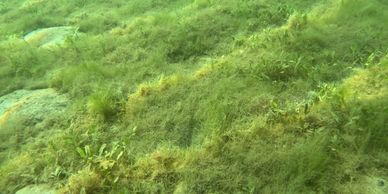
A benthic survey (also referred to as a seagrass survey) is an assessment of benthic resources such as submerged aquatic vegetation (SAV), corals, and hard bottom habitat. They are conducted via snorkeling or SCUBA by a qualified biologist to document the presence, location, and coverage of benthic resources within a project site.
During the permitting process through the environmental agencies, a benthic survey may be requested to determine the presence or absence of any benthic resources and thus, if your proposed project may negatively impact these resources and the environment. If resources are present within your project footprint, potential project design modifications may be necessary to reduce impacts to resources and/or to provide mitigation.
JJ Marine’s team of qualified biologists has extensive experience identifying and documenting benthic resources and providing the necessary survey report for submittal to the appropriate environmental agencies for review.
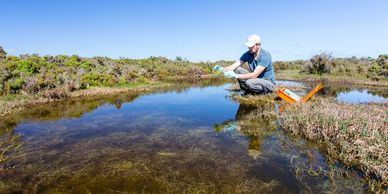
A permit through appropriate environmental agencies within the State of Florida is required for any development or construction activities that may impact wetlands and/or surface waters. Depending on the location and type of project, environmental resource permits may be required through the U.S. Army Corps of Engineers, Florida Department of Environmental Protection, South Florida Water Management District, Broward County Resilient Environment Department, and/or Miami-Dade County Regulatory and Economic Resources. Our staff has extensive experience with the type of permits and permitting process through each agency for a wide range of projects including but not limited to single-family residences, condominium developments, marinas, municipal bridge repair/replacements, and port projects. JJ Marine has extensive knowledge permitting seawalls, docks, boat lifts, dredging, and more.
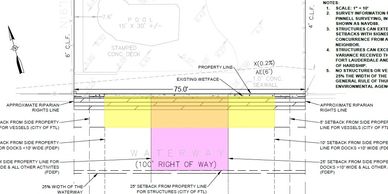
In the early stages of a marine project, it is essential to develop scaled conceptual drawings to explore different design options while ensuring compliance with regulatory agencies and local municipality setback and code requirements. JJ Marine prepares these conceptual plans first to discuss feasible design options with the client. Once a final design is selected and approved by the client, the plans are submitted to the relevant agencies for review and comment. This step helps identify potential regulatory concerns early in the process. After agency feedback is received, engineering plans are prepared to minimize unnecessary revisions, saving both time and costs. JJ Marine is proud to include these conceptual drafts as part of our permitting services.

Wildlife surveys or threatened and endangered species surveys are often required by regulatory agencies during permitting to determine the presence of protected species by federal, state and local agencies.
Our team of trained biologists can perform habitat mapping and conduct endangered/threatened species surveys as part of the preliminary site assessment and permitting requirements. Habitat mapping would involve the utilization of federal and state land cover databases to determine the natural community types occurring on site and thus the potential presence of listed species. A field survey would be conducted by our highly trained staff that are experienced in the identification of protected species for both plants and animals throughout South Florida. A few of the federally threatened and endangered species include the wood stork, burrowing owl, gopher tortoise, manatee, bonneted bat, and Florida panther. We regularly conduct preliminary threatened/endangered species surveys for due diligence and project planning purposes. If a particular protected species is identified on a project site, the regulatory agencies may require further species-specific surveys as part of the permitting process. We can assist you with protected species permitting through Florida Fish and Wildlife Conservation Commission (FFFWCC), mitigation strategies, and habitat management plans for protected species.
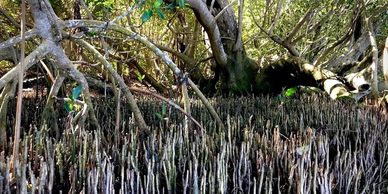
Through the consideration of local topography, vegetation, and hydrology, our team is able to enhance, restore, and replicate functions of natural forested and herbaceous wetland systems. Wetland mitigation is required throughout the permitting process to offset wetland impacts as a result of a proposed project. JJ Marine designs wetland mitigation projects to provide ecological benefits to compensate for the functional loss resulting from the project’s wetland impacts. A wetland is an area of land that is either covered or saturated by water at varying times throughout the year. The classification of a wetland is based on three factors: hydrophytic vegetation, hydrology, and hydric soil. To be considered a wetland, an area needs to have two of the three factors.
A preliminary site assessment would be done prior to a field survey to locate any previous permits obtained on the property, determine the type of soils onsite based on the U.S. Department of Agriculture Natural Resource Conservation Service Web Soil Survey, and determine the elevations of the site using SFWMD LIDAR, if information is available. A field survey would then be conducted to determine the presence, location, and extent of any wetlands present on a project site. A detailed report would be provided including the soil plug data forms taken in the field, photographs, and an aerial map showing the location and acreage of wetlands on site.
If wetlands are found to be present on site and the project involves any filling, dredging, or construction in, on, or over wetlands or other surface waters, then environmental permits are needed. There are different types of authorizations for wetland permitting for each agency dependent on the size of impacts. Our team of environmental professionals is experienced in providing the expertise needed to guide you through the federal, state, and local wetland permitting process.
Federal Wetland Permitting
Section 404 of the Clean Water Act regulates dredge and fill activities within waters of the United States (WOTUS). Waters of the United States are defined as navigable waters and waters that have a direct surface water connection to navigable waters or are subject to the ebb and flow of the tide. The appropriate federal permit is required from the U.S. Army Corps of Engineers for projects that involve the discharge of dredged or fill material into jurisdictional wetlands and WOTUS. During the review process, it may be determined that consultation with the U.S. Environmental Protection Agency, National Marine Fisheries Service, and/or U.S. Fish and Wildlife Service is warranted. Our team regularly prepares technical documents and analyses in response to requests for additional information from these and other federal agencies.
State Wetland Permitting
Prior to February 15, 2023, FDEP had the authority to process Section 404 permits for projects involving non-jurisdictional surface waters or wetlands, which would not be considered WOTUS. The U.S. District Court vacated FDEP’s ability to process Section 404 permits for projects involving non-WOTUS impacts on February 15, 2023 so all current and future applications for projects involving non-jurisdictional surface waters and/or wetlands would be processed by the U.S. Army Corps of Engineers. In addition, any projects involving wetland and/or surface water impacts require an Environmental Resource Permit (ERP) through the Florida Department of Environmental Protection or one of the state water management districts. Our team of ecologists is extremely knowledgeable of the permit application requirements and process to compile the environmental information to supplement the ERP application to process either a Verification of Exemption, General Permit, or Individual ERP.
Local Agency Permitting
Counties and municipalities may have their own rules and ordinances regarding impacts to wetlands. For example, Broward County Resilient Environment Department requires an Environmental Resource General License for projects that impact isolated wetlands or lakes that will not significantly degrade the environment as well as an Environmental Resource License for other projects involving wetland/surface water impacts. The Miami-Dade County Regulatory and Economic Resources requires a Class I permit for any wetland and/or surface water impacts.
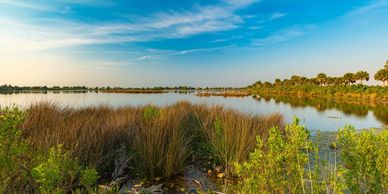
Through the consideration of local topography, vegetation, and hydrology, our team is able to enhance, restore, and replicate functions of natural forested and herbaceous wetland systems. Wetland mitigation is required throughout the permitting process to offset wetland impacts as a result of a proposed project. JJ Marine designs wetland mitigation projects to provide ecological benefits to compensate for the functional loss resulting from the project’s wetland impacts.
Wetland Mitigation Construction Coordination
Clear and concise mitigation plans are imperative for the success of any mitigation project. Although our mitigation plans provide the specifications needed to construct the mitigation project as designed, our coordination with the contractor will ensure that no details of the mitigation plan will be overlooked, all conditions of environmental permits are adhered to, and the client is informed and involved throughout the process.
Wetland Mitigation Monitoring
JJ Marine provides wetland mitigation monitoring services post-construction to measure the ecological success of wetland mitigation areas as required by the environmental permits. The success criteria established in the environmental permits for the project are evaluated during the monitoring. Aspects of wetland mitigation monitoring include vegetative community composition and coverage, exotic/nuisance species coverage, water level analysis, and wildlife monitoring.

During the permit process, sediment and/or water quality analyses may be required by an environmental agency to determine how the project may impact the surrounding environment. For example, a sediment analysis may be required to determine how a dredge project may impact the ecosystem based on its physical and chemical properties. As part of the permitting process, consideration and justification for how the proposed activities will not result in short-term or long-term negative impacts to water quality is required which may result in the need for a sediment and/or water quality analysis.
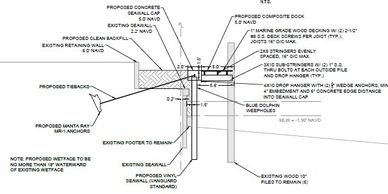
We develop innovative and comprehensive strategies to provide the design, development and reconstruction of residential, commercial, and waterfront projects. No job is too big or small. Furthermore, our team can provide any other necessary Engineering documents, including but not limited to Signed and Sealed Engineering Plans, Drainage Reports and Studies, Photometric Plans and Studies, and more. Our team of local engineers is experienced with the specifics of South Florida's waterways and requirements to provide the documentation required to obtain permits in a time and cost efficient manner.
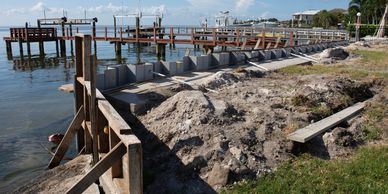
Once environmental permits are obtained and the structural design has been finalized, our team can assist with the bidding process and contractor selection within our network to provide the best quality work with the most competitive prices. Our on-going supervision throughout construction and great attention to detail is vital to a project to ensure conformance with environmental permit conditions.

Navigating local municipality codes can be challenging, especially when a marine project does not conform to standard setback or zoning requirements. JJ Marine assists clients in obtaining city variances and waivers when projects require exceptions to local regulations. We prepare the necessary applications, justification statements, and supporting documentation while coordinating with city staff to present a strong case for approval. Whether seeking relief from setback restrictions, structural limitations, or other municipal requirements, our team ensures a smooth process by leveraging our expertise in local codes and environmental regulations.
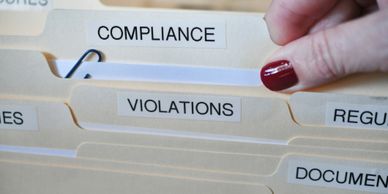
Receiving a violation for an unpermitted marine structure can be stressful, but JJ Marine helps navigate the resolution process efficiently. While we are not attorneys, we assist clients by preparing the necessary documentation, securing signed and sealed engineering plans, and submitting permit applications to bring structures into compliance. Whether it’s a dock, seawall, boatlift, or other marine construction that was built without proper approvals, we work with regulatory agencies and municipalities to find a solution. Our expertise in environmental permitting and city code requirements ensures a smoother path toward compliance, helping to avoid unnecessary fines or further enforcement actions.
Have a project in mind, need expert guidance, or want to learn more about our services? We're here to help. Whether it's marine permitting, environmental compliance, or coastal construction support, the JJ Marine & Environmental team is ready to assist.
📧 Email: info@jjmarineandenvironmental.com
📞 Phone: (954) 613-8833
Mon 9:00 am – 05:00 pm
Tue 9:00 am – 05:00 pm
Wed 9:00 am – 05:00 pm
Thu 9:00 am – 05:00 pm
Fri 9:00 am – 05:00 pm
Sat – Closed
Sun – Closed
Let’s connect and explore how we can help move your vision forward—efficiently, compliantly, and with expert care.